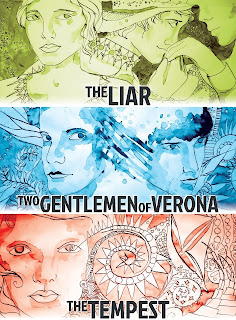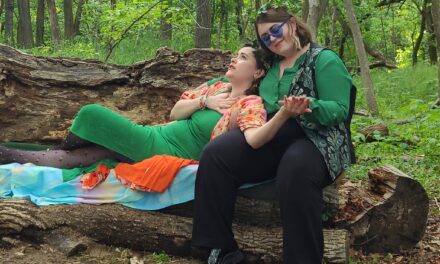Two Gentlemen of Verona
Written by William Shakespeare
Directed by J. Barrett Cooper
Review by Katherine Dalton
Entire contents copyright 2013 by Katherine Dalton, all rights reserved.
Shakespeare’s Two Gentlemen of Verona is one of his early plays, and in some ways it’s an unsatisfying one. The hero/anti-hero Proteus is really too much like Iago for our comfort in his studied betrayal of his guileless friend, and the reversals of fortunes and unmerited forgiveness at the end of the play are hard to credit. But Two Gentlemen is nonetheless a comedy full of fun and beautiful language, and this production is well served by its Walden Theatre cast and by its director, J. Barrett Cooper.
Proteus and Valentine are the two young gentlemen of the title, best friends who are separated when Valentine leaves for Milan to join the Duke’s court. There Valentine promptly falls in love with the Duke’s daughter, Sylvia, and she with him, despite the fact that the Duke has promised her to another. Proteus soon follows his friend, thus separating himself from his own beloved, Julia. Downcast at first, Proteus changes his tune when he sees Sylvia, and he quickly decides to forget his old love and cut out his old friend, trying to win Sylvia for himself by informing the Duke of Valentine’s intention to elope with her.
From here follows the bumpy course which true love often suffers on stage: Julia’s disguise as a boy to follow Proteus to Milan, a false wooing, an escape, a chase, a capture by brigands, and near disaster. But this being a comedy, which by definition must end with a wedding (or two), constancy and forgiveness finally overcome the wiles and evil of what is surely one of the playwright’s least attractive young lovers.
It is to the credit of Walden Theatre that for decades it has trained its actors to make sense out of language that is four hundred years old – language that sounds dense and difficult to modern ears that are all too used to the thin grammar of reality television. Proteus, Valentine and Julia have monologues that the actors made perfect sense of, because they themselves understood what they were saying, and because they were able to convey that understanding even to the sixth-grader (unfamiliar with the play) who sat next to me.
Both Christian Academy’s Parker Henderson (as Valentine) and Atherton’s Kenny Harris (as Proteus) spoke well, especially in their longer speeches, and conveyed the necessary emotion for the former character and coldness for the latter. YPAS student Courtney Doyle was a comically manic Julia; and Chloe Bell (also at YPAS) was particularly good in her later scenes when she showed her disdain and anger for Proteus.
Two Gentlemenis famous for its casting of a dog, and this production did not disappoint: Cinnamon played the rascally Crab with restraint and delicacy and was an excellent foil to her master in the play (and also real life), Trinity student DJ Nash, who acted the part of Proteus’s foolish servant, Launce.
Shakespeare wrote several comic parts that are all the funnier when they are given to tall, broad-shouldered actors (such as Mr. Nash) to play. I have seen a great bear of a man play a wonderful Touchstone in As You Like It; and in A Midsummer Night’s Dream the larger Bottom the Weaver is the funnier he is, especially when speaking through the chink. The same can be said of my favorite clown, Dogberry, from Much Ado About Nothing or Armado inLove’s Labours Lost. These fools take up a great deal of emotional space with their malapropisms and misunderstandings, and they are all the more comical when they take up a lot of physical space too. Mr. Nash’s lisp, timing and breadth of reach made good use of the excellent lines the playwright gave him to speak. He was a prince among fools, very funny, and fully up to the standard set by his dog.
Also memorable were St. Francis High School’s Lexi Drexelius as Valentine’s sharp-witted, Jersey-accented servant Speed, and the deliberate and implacable (till the end, that is) Duke played by Manual’s Travis Ryan. Noe’s Rachel Friedland did a good job in several small parts and I look forward to seeing her out of that beard and into some leading lady roles. Shana Lincoln’s costumes contrasted a squeaky-clean ’50s look for Verona with a harder-edged “steampunk” mid-’60s look for Milan – an artistic choice that conveyed clearly the darker emotional atmosphere of the Duke’s court. Kudos as well to stage manager Imogen Cooper of Highland Middle and lighting designer Cherrish Curry of Floyd Central, who ran light and sound cleanly on cue from the control booth – one of those jobs that goes unnoticed until it’s done badly.
Two Gentlemen of Verona
May 9-19
May 9-19
Running in repertory with The Liar and The Tempest in Walden’s annual Young American Shakespeare Festival
Nancy Niles Sexton Stage at Walden Theatre
1125 Payne Street
Louisville, KY 40205
502-589-0084




